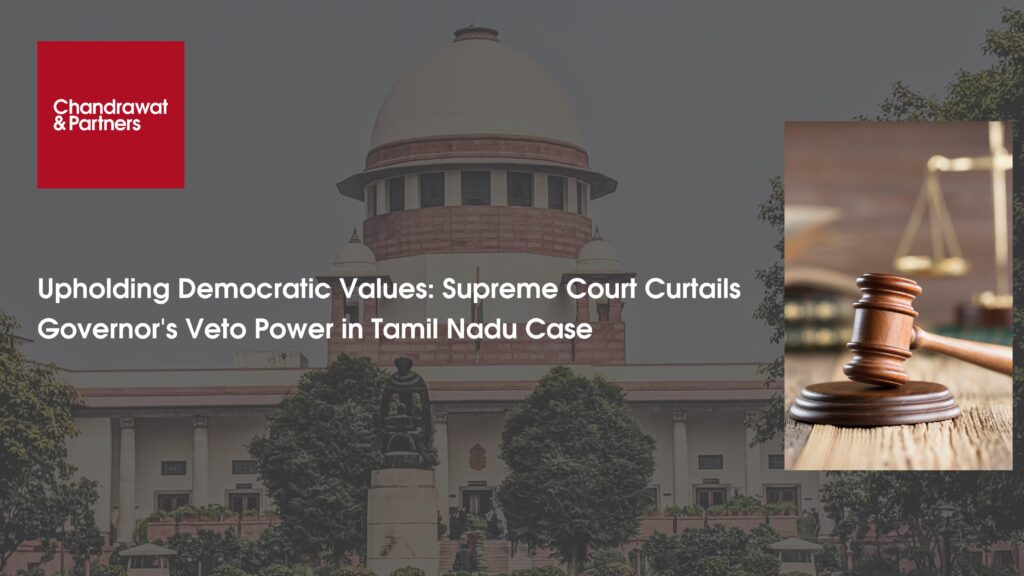Home > Recent Judgements > Upholding Democratic Values: Supreme Court Curtails Governor’s Veto Power in Tamil Nadu Case
April 10, 2025
Upholding Democratic Values: Supreme Court Curtails Governor’s Veto Power in Tamil Nadu Case
On 8th April 2025, the Supreme Court of India delivered a landmark judgment in the case of State of Tamil Nadu v. Governor of Tamil Nadu, significantly redefining the constitutional limits of gubernatorial authority over state legislation. The decision, pronounced by a two-judge bench comprising Justices J.B. Pardiwala and R. Mahadevan, held that a Governor does not possess the constitutional power to exercise an absolute or “pocket veto” over bills duly passed by a State Legislative Assembly.
This judgment marks a pivotal moment in Indian constitutional jurisprudence, reinforcing federal principles, democratic accountability, and the rule of law within India’s quasi-federal structure.
Background of the Case
The dispute arose from a protracted standoff between the Government of Tamil Nadu and the Governor of Tamil Nadu, R.N. Ravi. The controversy centered on ten bills that had been passed by the Tamil Nadu Legislative Assembly but were allegedly withheld indefinitely by the Governor, effectively exercising what is often termed a “pocket veto”—an informal, unstated rejection by refusal to act.
Despite repeated requests, no assent or return of the bills occurred for several months. In protest, the Tamil Nadu Assembly reconvened in November 2023, reintroduced and repassed all ten bills, and re-sent them to the Governor. This legislative move prompted judicial scrutiny, ultimately culminating in the Supreme Court’s authoritative intervention.
Core Issues Before the Court
The central constitutional questions examined by the Court included:
- Whether a State Governor can indefinitely withhold assent to bills passed by the State Legislature.
- Whether the Governor has discretion to veto state legislation without providing reasons or a timeline.
- Whether such executive action undermines the constitutional scheme of parliamentary democracy and federalism.
Supreme Court’s Ruling and Reasoning
In a well-reasoned and sharply worded decision, the bench ruled that:
- Governor Cannot Exercise Absolute or Pocket Veto
The Court unequivocally held that no constitutional provision permits a Governor to indefinitely withhold assent. While Article 200 of the Constitution provides certain options to the Governor such as granting assent, withholding assent, reserving the bill for presidential consideration, or returning the bill for reconsideration—the power to withhold action altogether does not exist.
“An indefinite delay or non-action on bills passed by the legislative assembly amounts to a subversion of the constitutional process,” the Court stated.
- Violation of Parliamentary Democracy
The judgment emphasized that India’s system is a parliamentary democracy, not an executive-dominant structure. The elected legislature represents the will of the people, and its decisions must be respected by the ceremonial head of the state. Allowing a Governor to override or stall the legislative process without justification undermines democratic principles.
“Such unilateral inaction is antithetical to the ethos of responsible government,” observed the bench.
- Judicial Review of Gubernatorial Inaction
The Court made it clear that gubernatorial decisions or the lack thereof are subject to judicial review, especially when they interfere with constitutional duties or disrupt governance. This lays down a precedent for accountability, placing limits on discretionary powers that are often assumed to be beyond judicial scrutiny.
Broader Constitutional and Political Implications
Reaffirmation of Federalism
This ruling is a strong assertion of cooperative federalism. It reestablishes the role of state governments as autonomous legislative units within the Indian constitutional framework.
Limiting Misuse of Constitutional Posts
By curtailing arbitrary use of office by the Governor, the Court has redefined the limits of constitutional morality and ensured that non-elected figures cannot paralyze elected institutions.
Balance Between Symbolic and Real Power
While the Governor remains the constitutional head of the state, this judgment reinforces that real executive power resides with the Council of Ministers, not in symbolic offices.
Legal and Academic Reactions
The legal fraternity has largely welcomed the judgment as a course correction. Constitutional experts note that this ruling:
- Bridges gaps in constitutional practice,
- Protects the sanctity of state legislatures,
- And sets a precedent for judicial intervention when democratic processes are delayed or obstructed.
Political commentators view this as a pushback against the centralization of power and a significant moment for state rights advocacy in India.
Conclusion
The Supreme Court’s verdict in State of Tamil Nadu v. Governor of Tamil Nadu is not just a legal milestone rather it is a democratic reaffirmation. By explicitly rejecting the idea of an unaccountable Governor, the Court has realigned constitutional function with constitutional form. The decision safeguards the integrity of legislative processes, reinstates the supremacy of elected representatives, and strengthens the framework of federal democracy in India.
For more information or queries, please email us at
[email protected]





